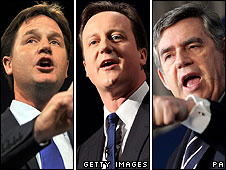
Gordon Brown will announce on Tuesday morning that the general election will, as expected, be held on 6 May, BBC political editor Nick Robinson says.
The prime minister will go to Buckingham Palace to ask the Queen to dissolve Parliament.
On returning from the Palace he will formally confirm the date and make a speech in Downing Street in which he will dub the election “the big choice”.
The economy, taxation and public services will be key battlegrounds.
The campaign will also feature, for the first time, live television debates between the three main party leaders.
It will be the first time that Mr Brown, David Cameron and Nick Clegg have faced a general election.
On returning from the Palace, Mr Brown is expected to say: “The people have fought too hard to get Britain on the road to recovery to allow anybody to take us back to the road to recession.”
He will outline “three big challenges” facing the country – securing the recovery, protecting front line services whilst halving the deficit, and renewing politics.
At about the same time, Mr Cameron will make a speech in which he is expected to say the Tories are fighting for “the Great Ignored”.
“We’re fighting this election for the Great Ignored – young, old, rich, poor, black, white, gay, straight.
“They start businesses, operate factories, teach our children, clean the streets, grow our food and keep us healthy – keep us safe. They work hard, pay their taxes, obey the law,” he will say.
Meanwhile in an address to party workers, Liberal Democrat leader Nick Clegg is expected to say the announcement will mark the “beginning of the end for Gordon Brown”, claiming he is “directly and personally responsible for the biggest mistakes of the last 13 years”.
He is expected to highlight the banking crash and recession, the “illegal invasion of Iraq”, the “corruption and rottenness in our politics” and claim Britain has become more unequal and unfair under Labour.
Their parties – along with a host of other smaller parties – will be fighting for 650 seats, four more than currently exist because of constituency boundary changes.
To secure an overall majority, a party must win at least 326 – if no party makes sufficient gains, the result will be a hung Parliament.
After 13 years in power, Labour enters the election with a notional majority of 48 seats, meaning that a loss of 24 seats would see them lose their overall majority.
Whatever the result, the make-up of the House of Commons will change significantly following the election, with 144 MPs so far having announced that they will stand down.
Polls in recent weeks have suggested a narrowing of the Conservative lead over Labour, and it is clear that the economy is set to be the number one issue.
On Monday, the prime minister defended Labour’s record on dealing with the recession and laying the foundations for recovery.
He said Tory plans, in particular to reverse Labour’s planned National Insurance rise, were a risk the UK “can’t afford” and could send the country into a “double-dip recession”.
For their part, the Tories say the NI rise would lead to job losses and argue that by making £6bn of government efficiency savings this financial year they can remove the need to implement most of the policy.
The Conservatives say they could bring down the UK deficit without any tax rises on top of those already announced – including a levy on bank transactions – and have said they have no plans at present to raise VAT.
The Liberal Democrats have accused the Tories of “treating people like fools”, claiming their NI policy is uncosted, and while unwelcome, a rise in contributions is unavoidable.
They have set out plans for £15bn of public spending cuts, a “mansion tax” on properties worth more than £2m and an end to income tax on the first £10,000 of earnings.
The economy has already been the subject of one live television debate – between Chancellor Alistair Darling and his Tory and Lib Dem counterparts – on Channel 4 last week.
It will again be the focus of one of the live leadership debates to be held during the formal election campaign on the BBC, Sky and ITV. The other two will cover domestic affairs and international policy.BBC

Leave a Reply
You must be logged in to post a comment.